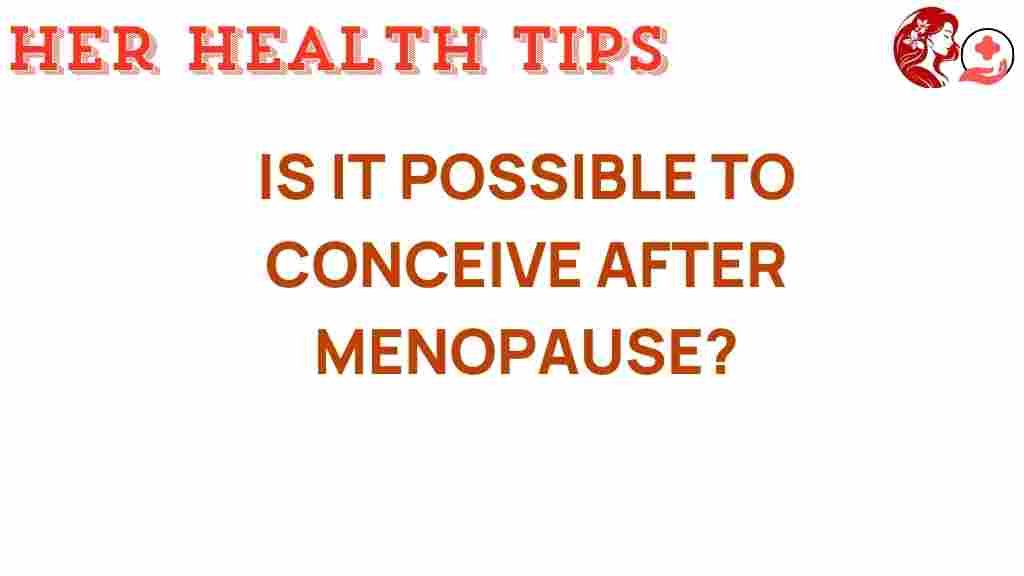Exploring the Possibility: Can Women Conceive After Menopause?
Menopause is a natural phase in a woman’s life, marking the end of her reproductive years. It is characterized by the cessation of menstruation and a decrease in fertility due to hormonal changes. Many women wonder about the implications of menopause on conception and whether pregnancy is still possible after this phase. In this article, we will explore the relationship between menopause, conception, and women’s health, focusing on reproductive health, ovulation, and hormonal changes. We will also touch on the concept of postmenopause and its effects on fertility.
Understanding Menopause and Its Stages
Menopause typically occurs between the ages of 45 and 55, but can vary widely among women. It is divided into three stages:
- Perimenopause: This is the transitional phase leading up to menopause, during which hormonal changes begin. Women may experience irregular periods and symptoms like hot flashes.
- Menopause: Defined as 12 consecutive months without a menstrual period, menopause signifies the end of natural ovulation and fertility.
- Postmenopause: This stage follows menopause and lasts for the rest of a woman’s life. Hormonal levels stabilize but are significantly lower than during a woman’s reproductive years.
The Impact of Hormonal Changes on Conception
During menopause, a woman’s ovaries produce less estrogen and progesterone, leading to the cessation of ovulation. Without ovulation, natural conception becomes unlikely. However, there are exceptions and nuances to consider:
- Hormonal fluctuations: In the perimenopausal stage, women may still ovulate sporadically, leading to the possibility of conception.
- Assisted reproductive technologies: Advances in reproductive health, such as in vitro fertilization (IVF), may provide options for women seeking conception post-menopause.
Can Women Conceive After Menopause?
While natural conception after menopause is extremely rare, it is not entirely impossible under certain circumstances. Here are some scenarios where conception might occur:
1. Hormonal Therapy and Fertility Treatments
Women who wish to conceive after menopause may consider hormonal therapy, which can stimulate ovarian function. Fertility treatments like IVF can also be an option:
- Egg Donation: Women in postmenopause can use donor eggs, combined with their partner’s sperm, to achieve pregnancy.
- Embryo Adoption: This involves adopting an embryo created through IVF, which can then be implanted in the woman’s uterus.
2. Rare Cases of Natural Conception
There have been anecdotal reports of women conceiving naturally after menopause, primarily during the perimenopausal phase. This is due to:
- Irregular ovulation: Women may still have sporadic ovulation during perimenopause, leading to potential conception.
- Late onset menopause: Some women experience menopause later than average, which may allow for longer fertility.
Reproductive Health and Aging
Understanding reproductive health is crucial for women as they age. Here are some important factors to consider:
1. Monitoring Hormonal Changes
Regular check-ups with healthcare providers can help women monitor their hormonal levels and understand their reproductive health. Hormonal changes can impact overall health, including:
- Bone density
- Cardiovascular health
- Mental health
2. Lifestyle Factors
Maintaining a healthy lifestyle can have a positive impact on reproductive health:
- Diet: A balanced diet rich in nutrients supports overall health.
- Exercise: Regular physical activity can help manage weight and improve health.
- Avoiding smoking and excessive alcohol: These can adversely affect hormonal balance and overall health.
Troubleshooting: Challenges Women Face Post-Menopause
Women may encounter various challenges concerning fertility and reproductive health after menopause:
1. Emotional and Psychological Impact
Facing infertility after menopause can be emotionally challenging. Women may experience feelings of sadness or grief. Seeking support from counselors or support groups can be beneficial.
2. Physical Health Concerns
Postmenopausal women may have increased health risks, including:
- Heart disease
- Osteoporosis
- Weight gain
Regular health check-ups and screenings can help manage these risks.
3. Financial Implications of Fertility Treatments
Fertility treatments can be costly. Women considering these options should research and understand the financial aspects, including:
- Insurance coverage
- Out-of-pocket expenses
- Financial assistance programs
Conclusion
While natural conception after menopause is unlikely, advances in reproductive health and technologies provide potential pathways for women wishing to conceive. Understanding menopause, hormonal changes, and the options available can empower women to make informed decisions about their reproductive health. Maintaining a healthy lifestyle and consulting with healthcare professionals can further support women’s health during and after this transitional phase.
For more information about women’s health and reproductive options, visit this resource. If you’re looking for support or community, check out this link for valuable information.
This article is in the category Reproductive and created by HerHealthTips Team
